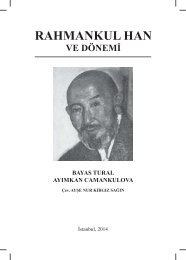THE SOVIET HISTORIOGRAPHY AND THE QUESTION OF KAZAKHSTAN’S HISTORY
SOVYET-TARIH-YAZICILIGI-ENG
SOVYET-TARIH-YAZICILIGI-ENG
You also want an ePaper? Increase the reach of your titles
YUMPU automatically turns print PDFs into web optimized ePapers that Google loves.
<strong>THE</strong> <strong>QUESTION</strong> <strong>OF</strong> <strong>KAZAKHSTAN’S</strong> <strong>HISTORY</strong> 175<br />
establishment of Academy of Sciences. Journals were published as<br />
news in the History Institute of the Academy of Sciences of the USSR.<br />
The works of historians could be published in the scientific journals<br />
called «News» that existed at universities. Despite the constant<br />
change of names and temporality of some journals, they helped<br />
historians in terms of publication. In this system, historians tried to<br />
publish their works to conform with Bolshevik ideology. The editorial<br />
and advisory boards, along with the management of these journals,<br />
were the members of the Communist Parties.<br />
8. The Historian and Abroad<br />
For historians, just like to other scientists, it is important to be<br />
aware of new publications and advances in the entire world as it is<br />
related to their professional field. But, scientists and historians in the<br />
USSR faced difficulties, such as persecution by the Soviet government<br />
that controlled all incoming and outgoing publications through its<br />
ideological prisms, so that historians had to write works that were in<br />
accord with Soviet ideology.<br />
The entry and exit, export and import, of all books and publications<br />
in the Soviet Union were carried out by the institution called<br />
«International Book». The Soviet Union Author’s Rights Agency (VAAPI<br />
-Vsesoyuznoe agentstvo avtorskix prav) was responsible for all publications<br />
entering the country and being sent abroad. A censorship<br />
organization GLAVLIT also played a big role in the review of incoming<br />
and outgoing works in the USSR.<br />
According to data from 1928, 55,400 foreign language books, 250,948<br />
units of magazines and newspapers entering to the country form<br />
outside world were introduced. 3,098 of these books (5,5 %) and<br />
19,718 units of magazines and newspapers (7,8 %) were prohibited. 317<br />
The ideological approach applied to the export and import of<br />
publications was also evident in the control of scientists who were<br />
coming to the USSR or going out. Since 1930, such prohibitions were<br />
widely enforced. The international scientific relations experienced<br />
a serious crisis in 1930, which continued until 1937. In that period,<br />
travel by scientists abroad was prohibited, some foreign scientists<br />
were deported from the country, and a large number of them were<br />
arrested. International conferences were organized in the country,<br />
but the government banned anyone from sending materials abroad. 318<br />
317 “ГЛАВЛИТ”, Литерaтурнaя Энциклопедия в 11 томaх. Том 2, Moscow<br />
1930.<br />
318 Виногрaдовa, T. В. – Кожевников, А. В., “Учений и госудaрство:



